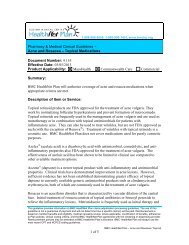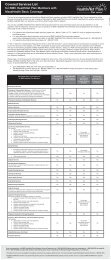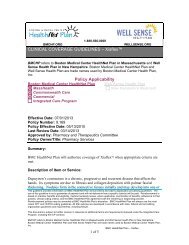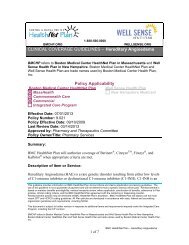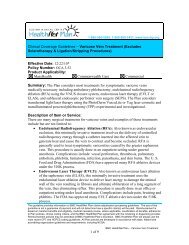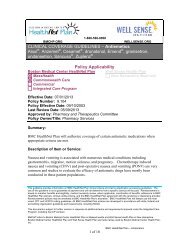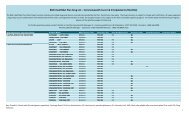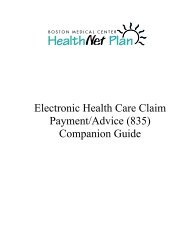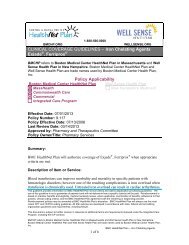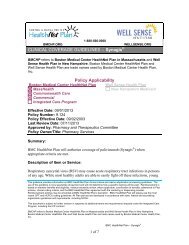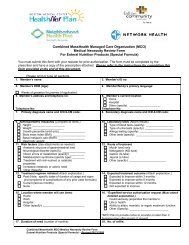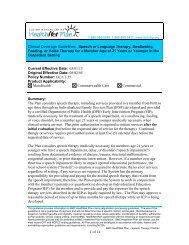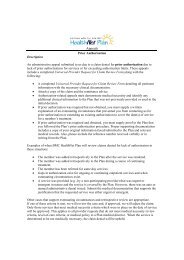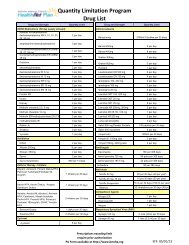IVIG - BMC HealthNet Plan
IVIG - BMC HealthNet Plan
IVIG - BMC HealthNet Plan
Create successful ePaper yourself
Turn your PDF publications into a flip-book with our unique Google optimized e-Paper software.
0.46 for both groups. No significant differences between the treatment groups were<br />
found in any of the other clinical outcome measures or in the change of T2-lesion<br />
load over time. In another placebo-controlled trial, patients with primary progressive<br />
(n = 34) or secondary progressive (n = 197) multiple sclerosis were randomized to<br />
<strong>IVIG</strong> once monthly or placebo for 2 years. 141 Mean duration of multiple sclerosis was<br />
14 to 15 years and mean EDSS scores were about 5.5 at baseline. In the intent-to-treat<br />
population (both groups combined) <strong>IVIG</strong> delayed progression by 12 weeks compared<br />
to placebo and diminished the rate of patients with sustained progression by 15%; this<br />
effect was significant in those with primary progressive disease. In all, 51% of<br />
patients withdrew from the study. The study was not powered to show differences<br />
between the primary and secondary progressive groups and the number of patients<br />
with primary progressive disease was too small to draw valid conclusions. EDSS<br />
scores were similar with <strong>IVIG</strong> and placebo. Treatment with <strong>IVIG</strong> cannot be<br />
recommended for patients with secondary or primary progressive multiple sclerosis.<br />
27. Multiple sclerosis, relapsing remitting for the prevention of relapses. <strong>IVIG</strong> has<br />
been beneficial in controlled trials in preventing relapses in relapsing remitting<br />
multiple sclerosis, but additional studies are needed. 20,21,23,139 The studies of <strong>IVIG</strong><br />
have usually involved small heterogeneous patient populations, have lacked complete<br />
data on clinical and MRI outcomes, or have used methods that have been questioned.<br />
It is possible that <strong>IVIG</strong> reduces the attack rate in relapsing remitting multiple<br />
sclerosis. 141 In a retrospective analysis of pregnant women with relapsing remitting<br />
multiple sclerosis, patients who received <strong>IVIG</strong> during pregnancy and postpartum or<br />
postpartum only had lower relapse rates than those who were untreated. 139<br />
Randomized, double-blind trials are needed to confirm these findings, to determine<br />
the optimal dose, and to compare <strong>IVIG</strong> with beta interferon and glatiramer. Current<br />
evidence suggests <strong>IVIG</strong> is of little benefit in slowing disease progression. 139,141<br />
28. Neonates, for suspected or proven infection. Evidence does not support <strong>IVIG</strong><br />
use. 156 There is not sufficient evidence to support routine administration of <strong>IVIG</strong> to<br />
prevent mortality from suspected or subsequently proven infections in neonates. A<br />
large study of the effectiveness of <strong>IVIG</strong> in neonates with suspected infection has been<br />
completed, results are not yet available. 156-157 Further research is needed.<br />
29. Neonates, high-risk hypogammaglobulinemic. Evidence does not support <strong>IVIG</strong><br />
use. 24<br />
30. Neonates, high-risk, preterm, low birth weight, infections in (prophylaxis and<br />
treatment adjunct). Evidence does not support <strong>IVIG</strong> use. 1,142 <strong>IVIG</strong> results in a 3%<br />
reduction in sepsis and a 4% reduction in any serious infection, but is not associated<br />
with reductions in other important outcomes; <strong>IVIG</strong> does not have any significant<br />
effect on mortality from any cause or from infections. 142 Early studies suggested<br />
prophylactic <strong>IVIG</strong> reduced nosocomial infections in low birth weight infants but<br />
these studies had many deficiencies. In a large prospective trial, prophylactic <strong>IVIG</strong><br />
did not reduce the incidence of nosocomial infections in premature infants who<br />
weighed 501 to 1500 grams at birth. 143 Morbidity, mortality, and duration of<br />
hospitalization were not different between <strong>IVIG</strong> and placebo.<br />
This guideline provides information on <strong>BMC</strong> <strong>HealthNet</strong> <strong>Plan</strong> claims adjudication processing guidelines. The use of this<br />
guideline is not a guarantee of payment and will not determine how a specific claim(s) will be paid. Reimbursement is<br />
based on member benefits and eligibility, medical necessity review, where applicable, coordination of benefits, adherence<br />
to <strong>Plan</strong> policies, clinical coding criteria, and the <strong>BMC</strong> <strong>HealthNet</strong> <strong>Plan</strong> agreement with the rendering or dispensing provider.<br />
Reimbursement policies may be amended at <strong>BMC</strong> <strong>HealthNet</strong> <strong>Plan</strong>’s discretion. <strong>BMC</strong> <strong>HealthNet</strong> <strong>Plan</strong> will always use the<br />
most recent CPT and HCPCS coding guidelines.<br />
<strong>BMC</strong> <strong>HealthNet</strong> <strong>Plan</strong> – <strong>IVIG</strong><br />
30 of 45



